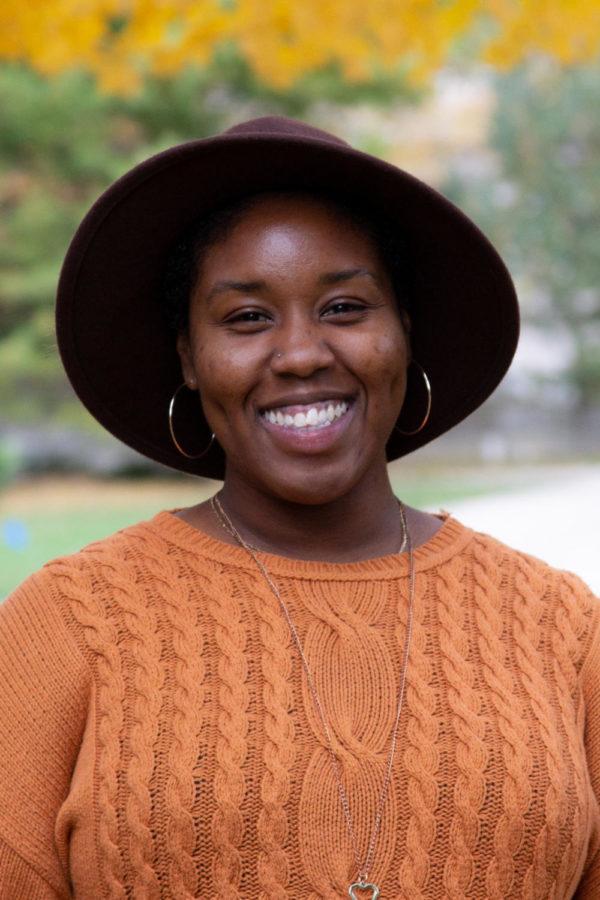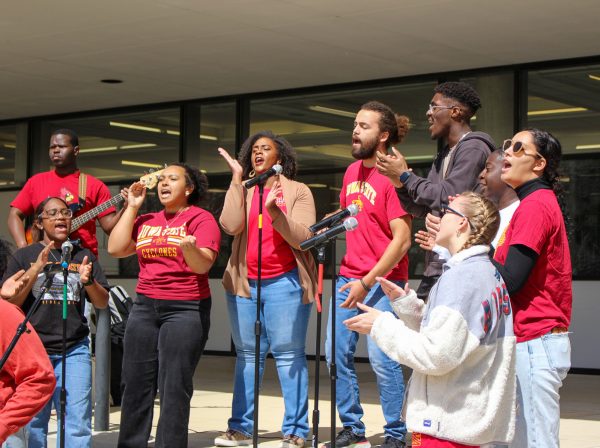First gen graduate students of color navigate a predominantly white institution
Iowa State graduate student in education, first generation student and student of color, Vashalice Kaaba.
December 3, 2019
Students of color and first generation students are automatically put at a disadvantage in a college environment because of their marginalized identities, but those identities are not holding graduate students at Iowa State back.
Vashalice Kaaba, a graduate student in education, is a first generation student herself. Originally from Bealsville, Florida, Kaaba earned her bachelor’s degree from Florida State University and was a literacy specialist with Peace Corps Uganda and City Year Miami.
For Kaaba, college was always an expectation. She was the first person in her immediate family to attend and graduate with a four-year degree from a university. Kaaba said her mother was always very open about wanting her to attend college because of how “smart” she was and it seemed like the next natural progression.
Kaaba agreed with her mother.
“I wanted to go simply because I was smart and I knew that with my intelligence I could make a difference in my life and my family,” Kaaba said. “Intellect was my way to explore the world outside of my rural, country upbringing.”
Kaaba said her mother encouraged her greatly, as well as Upward Bound based at the University of South Florida.
According to their website, “Upward Bound provides fundamental support to participants in their preparation for college entrance. The program provides opportunities for participants to succeed in their precollege performance and ultimately in their higher education pursuits.”
Kaaba said Upward Bound was key to her becoming more exposed to college and helped prepare her for higher education by offering tutoring as well as providing her and her peers with college visits.
After her undergraduate years at Florida State and time spent in the Peace Corps and City Year, Kaaba began to consider graduate school.
“I wanted to go to graduate school because for me it was the perfect way to link my work in the Peace Corps to my advanced education,” Kaaba said. “I was nervous about applying to ISU or to any graduate school, honestly. My GPA after undergrad was not the best and I was relying on the strength of my fieldwork.”
Kaaba said she had faith that she could be accepted into graduate school and overcome obstacles along the way. Iowa State saw the potential that Kaaba had seen in herself too.
Not only does Kaaba hold the minoritized identity of a first generation college student in graduate school, but she is also a person of color (POC) at a predominantly white institution (PWI).
“This is my second time holding these two identities — first gen and attending a PWI as a POC — and yes there was — and still is — added stress and difficulty,” Kaaba said. “My biggest issue that I face is the transition from region to region.”
Kaaba was born in the South and said she sees certain prejudices like racism present in the Midwest as well — but it’s different than how she is used to experiencing it.
“The concept of ‘Iowa Nice’ is new to me,” Kaaba said. “Being very transparent, I am used to overt racism versus covert racism in a college setting. Racism and prejudice is harder to see, catch and prove unless you are trained to see it.”
Kaaba gave advice for other POC at a PWI.
“Make sure you have a strong support system, or if you do not have one, create one, and if you are able to and can afford it, speak to a therapist,” Kaaba said. “I want mental health normalized in POC communities. My support system here at ISU and my therapist made it possible for me to thrive and do well in this space. Their support and help was a God-send.”
Annabelle Lolinco, graduate student in chemistry at Iowa State, is also a first generation student in graduate school who is a POC at a PWI. Lolinco grew up in central California all the way through her undergraduate education, as she stayed local for college.
Similarly to Kaaba, Lolinco said she always knew she was expected to attend college.
“College was an expectation in the way that everyone I knew — at my church, in my school, in my neighborhood and my family — had this idea that I should go,” Lolinco said. “I unconsciously knew it was the next thing after high school, but I didn’t really know what it all entailed.”
Lolinco said college didn’t even feel real to her until she was literally in it. Even though she stayed local, Lolinco said higher education was so different because her world became much larger than family and school. Lolinco explained her journey to college.
“It was part routine and part ready to take the next step in exploring who I wanted to be,” Lolinco said. “Routine because the people I knew, like upperclassmen, were all applying to colleges. My counselors all assumed I was going into college, my parents wanted me to get my degree and excel in what they couldn’t do when they came to the United States.”
Also in the Upward Bound program, Lolinco said her counselors gave her strong encouragement to go to college as well.
“My parents didn’t go to college, and so I didn’t know what was all involved in the process,” Lolinco said. “I became more analytical and detail-oriented because I just did not know who to turn to, so I turned to anyone and everyone I could and did as much legwork as I could.”
Lolinco said she didn’t even know she wanted to go to graduate school — especially in chemistry — until the tail-end of her undergraduate career.
“I picked my majors simply by interests — chemistry and communication,” Lolinco said. “Superficially in the sense that there was no ulterior motive, which admittedly seems reckless now. I thought, ‘If I wasn’t even going to like what I was studying, what was the point?’ and that line of thought always kept circling back even as I questioned if I was in the right place.”
But several things fell into place for Lolinco. She did research as an undergraduate student and said her mentor and adviser was just the type of personality that meshed well with the way she worked.
In addition, a professor built the idea of science communication for her, which is where Lolinco ended up veering toward in terms of career goals. She also got involved in Chemistry Club at a national level. Without even realizing it, Lolinco was making graduate school an achievable goal for herself.
Lolinco said she has met amazing cheerleaders within her professional society, the American Chemical Society (ACS). Some of these cheerleaders were also first generation scholars who participated in TRiO (federal outreach and student services programs) and/or were people of color.
Lolinco said “all were steadfast in their support.”
She also said ACS has given her many opportunities to explore all the possibilities of what she can do as a scientist. Lolinco was lucky enough to have institutional support that reiterated the idea that she could be successful in graduate school.
Lolinco said when deciding which graduate program she wanted to be a part of, location and surroundings were a definite factor.
“Ultimately, choosing to transplant from Iowa to California, I had to look really hard about what I was losing,” Lolinco said. “Part of that was the communities I was a part of — many people at Fresno State, my alma mater, first generation students and people of color. Knowingly, going to a primarily white institution raised concerns for me.”
Lolinco described her first year at Iowa State’s graduate program as “infinitely harder” than she expected, especially from the standpoint of getting used to cultural norms. She didn’t know many people and said she definitely felt out of place in her program. But Lolinco found support from the Womxn of Colour Network and their retreat.
“It was just a relief to spend a relaxing, reinvigorating weekend or a couple of hours a semester around people at all different levels at Iowa State feeling the same sort of pressures and stresses,” Lolinco said. “I started to get out more and appreciate the place I’m in now, but it’s always a work in progress.”
Lolinco also had some words of advice for first generation students.
“Make sure you have a plan of what you’re going to do,” Lolinco said. “It doesn’t have to stay the same, but I think people get lost in the idea that more education is better. Graduate school is just one way of getting more education. It’s tough and if it’s not something you’re willing to stick with, it is challenging.”

















